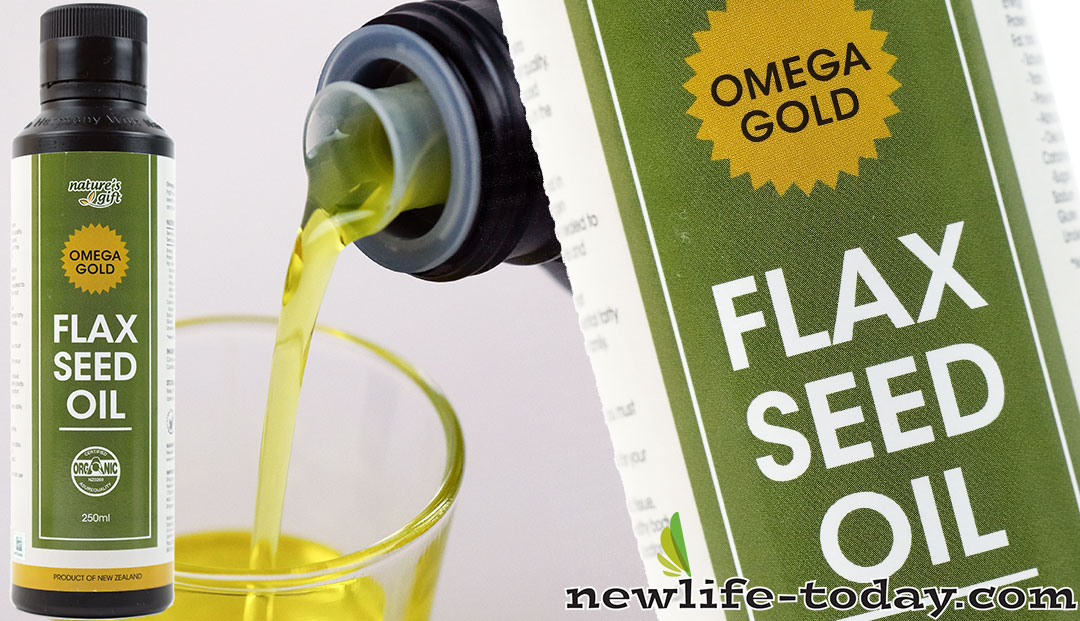
How To Select High Quality Flaxseed Oil?
Obtaining high-quality flax seed oil is a major challenge for consumers. In order to receive the benefits described earlier, it is critical that the oils are produced from high quality seeds with preparation and handling methods that are able to protect the highly polyunsaturated oil. Because of its delicate polyunsaturated bonds, flax seed oil easily turns rancid. Thus, extreme care must be taken during processing and subsequent handling of the product.
NewLife™ Omega Gold Flax Seed Oil is produced from highest quality Golden Flax Seeds sourced exclusively from a contract farm in Western Victoria. The oil is extracted by expeller presses under Modified Atmosphere Packing (MAP), that is, the oil is produced under controlled atmosphere of low temperature and in the absence of light or oxygen.
They are air-freighted and always kept cool to ensure full protection of its quality.
With all the hype surrounding a number of dietary supplements on the market, why should I consider to add flax seed oil as one of them?
There is evidence that suggests a widespread deficiency of essential fatty acids in our diet. These essential fatty acids are directly and indirectly responsible for and involved with countless important and life-sustaining biological functions. A lack of these essential fatty acids has been associated with a number of diseases, including heart problems, cancer, stroke, etc. These essential fatty acids found most abundantly in flax seed oil and they are truly “essential” to life.
Who needs to take flax seed oil?
Because of the virtual elimination of Omega 3 from our food chain, and the fact that flax seed oil is a rich source of Omega 3, everyone needs to take flax seed oil for optimal health.
How can flax seed oil have such profound effects on so many health problems?
Often, the main cause of these health problems is the extreme lack of essential fatty acids in our modern diet. Once these essentials are returned to the diet, the body is equipped to carry out the biological functions. The essential fatty acids are a prerequisite to optimizing body performance. Because of this, many numerous diseases and health problems improve. Up to now, over sixty illnesses and health problems are related to Omega 3 deficiency.
How much flax seed oil should one take on a daily basis?
For most people, one tablespoon for every 100 pounds of body weight is recommended.
Dr. Johanna Budwig, a seven-time nominee for the Nobel Prize, after three decades of research, found that the blood of seriously ill patients was always, without exception, deficient in essential ingredients called phosphatides and lipoproteins. Blood analysis showed a strange greenish-yellow substance in place of the healthy red oxygen carrying haemoglobin. Dr. Budwig, in feeding cancer patients with flax seed oil and quark (a product from low fat yoghurt) for three months, found that the greenish-yellow substance in the blood was replaced with red pigment haemoglobin. The phosphatides returned and the lipoproteins reappeared. Tumours receded and disappeared, anaemia was alleviated and vitality returned.
Relieve Depression and Boost Your Brainpower:
New findings show a powerful connection between mental health and a severe lack of Omega 3. These include depression, anxiety, attention deficit, hyperactivity disorder (ADHD) and schizophrenia.
But clinical evidence shows a reliable source of Omega 3 can relieve these symptoms: A recent Italian study found that people who took Omega 3 for just a month felt improved attention, elevated mood and a “sharper mind,” better equipped for complex information processing.
Improve Athletic Performance:
The most dramatic testimony to the power of Omega 3 essential fatty acids was demonstrated by Dr. Johana Buckwheat when the Russian and East German Olympic athletes were accused of using steroids and performance enhancing drugs. She showed they were simply using all natural foods, flax seed oil and quark (a yoghurt product) to help enhance the athletic performance.
Dr. Colgan in his book Essential Fats mentioned a news report that the Scandinavian and British Olympic committee have officially approved Omega 3 fatty acid supplements for all their athletes in order to recognize the blatant omega-3 deficiency in Western diets.
Organic Flax Seed Oil contains 1:3 of Omega 6 to Omega 3 ratio. It should be our first choice to combat the likely long-standing Omega 3 deficiency.
Can one take too much flax seed oil?
All food, nutrients, and elements including water and oxygen, when consumed or breathed at excessive levels may become counter productive to the body. With flax seed oil, a safe guideline is the recommendation in the earlier answer. However, flax seed oil has been used in much larger dosages in the treatment of cancer and other diseases. In these instances, it is strongly advised that you are under the guidance of a qualified naturopathic or holistic medical doctor.
Can I expect to get the same benefits from flax seed oil found in gelatine capsules as I would from the bottled liquid type?
Generally, one should be wary of oil products sold in gelatine capsules. The only way to test the quality of encapsulated oils is to puncture the capsule and taste the oil. If the oil has a rich, robust, and nutty flavour, it is most likely unrefined and relatively fresh. If there is an off-flavour, it is rancid oil. If there is little or no taste, you have just sampled a refined oil product. Oil products found in gelatine capsules are not as high quality because of the extra manufacturing step taken to encapsulate them. Furthermore, the pure liquid oil is far more economical, especially when you consider that you have to take at least nine 1000mg flax seed oil capsules just to get 1 tablespoon of flax seed oil.
Is there a preference for taking flax seed oil alone or with food?
There are several advantages to taking flax seed oil with yoghurt and yoghurt products. It helps to emulsify the oil, aiding in optimal digestion, absorption, and utilization of the essential fatty acids. Based on the work of Dr. Budwig, adding flax seed oil to yoghurt products helps in incorporating the essential fatty acids into cellular membranes.
What do you think of a certain product that contains flax seed oil and some other vegetable oils like safflower oil and sesame oil? Their argument is to increase the amount of Omega 6 of the flax seed oil so that the ratio of Omega 6:Omega 3 becomes 1:2 in order to provide a more optimal Omega 6 / Omega 3 profile for the body.
Because of the up to 20:1 Omega 6 to Omega 3 ratio found in the diet of the general population, the last thing we want would be to increase the amount of Omega 6 to flax seed oil.
Instead, a better suggestion would be to eliminate the hidden sources of Omega 6 oils from the diet and supplement it with flax seed oil that contains Omega 6 and Omega 3 in the ratio of 1:3. The reduction of Omega 6 oils in your diet and the addition of large quantity of flax seed oil will help you gain the optimal ratio of Omega 6 to Omega 3 fatty acids profile for balanced and efficient production of prostaglandins and their health enhancing qualities. It should be noted that in cases of chronic and degenerative diseases, the body’s demand for Omega 3 would be further increased for therapeutic uses because there is a greater need for Omega 3 oils to correct the underlying imbalance of essential fatty acids in cellular membranes and prostaglandins synthesis.



